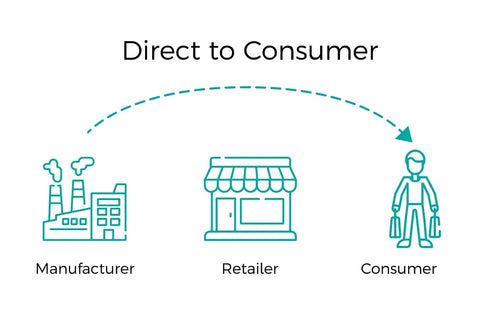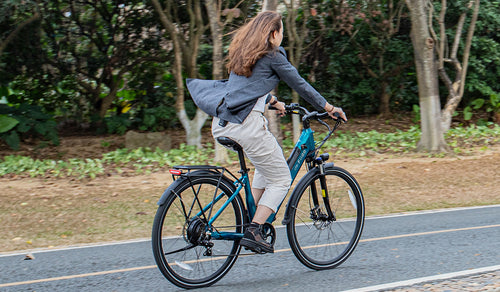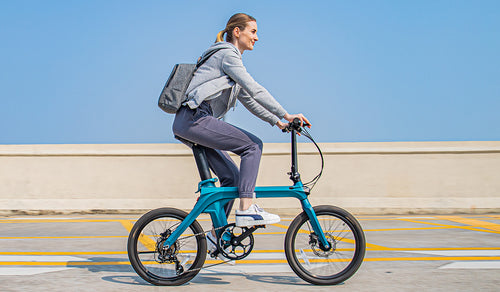You may be considering buying an electric bike but are unsure whether you'll benefit more from a traditional bike. This is understandable, as there are quite a lot of things to consider. So, in this article, we'll closely examine the electric bike vs. traditional bicycle debate so you can decide whether to go for battery power or not.
Electric Bike vs. Traditional Bicycles: The Key Differences
Electric bikes vs. traditional bicycles—how do they stack up? Let's take a look at the key differences.
1. Electric Bikes Assist Your Pedaling
An electric bike's motor and battery system seamlessly amplifies your pedaling, providing several advantages. One of the most significant benefits of electrical power on a bike is that you can ride uphill much more easily. In fact, once you get used to the sensation of pedaling an electric bike, climbing hills becomes addictive. This contrasts with pedaling uphill on a traditional bike, which is hard work and slow.
However, don't assume that riding an electric bike is cheating; you can still get a good workout. Select a lower assistance level to work up a sweat or a higher one for a leisurely cruise; the choice is yours.
2. Quick Getaways From Traffic Lights And Junctions
Setting off from traffic lights and junctions on a regular bike can be slow and require lots of effort to get going. However, an electric bike immediately launches you off the line, allowing you to join and keep up with the flow of traffic.
3. Tackling Headwinds with Ease
If you've ridden a traditional bike into a headwind, you'll know how difficult it can be. However, the power from the motor helps you pedal into the wind as if it were blowing you from behind.
4. Ride Further On An Electric Bike
The pedal-assist technology, combined with your pedal power, extends your range. The motor allows you to cover longer distances before you get tired. This means you can visit new places further afield that would be impossible or challenging on a traditional bike. These longer rides are less daunting on an electric bike, encouraging you to get out and exercise.
In theory, the range of traditional bicycles is only limited by the rider's stamina as it isn't affected by battery power running out. So, with this in mind, it's essential to understand the limitations of an electric bike and how to overcome them:
1. Battery Capacity
One of the main things determining an electric bike's range is its battery capacity. If you ride beyond the battery's limit, you'll run out of power before you reach your destination. You can still ride the bike with an empty battery; it's just that the motor no longer assists you.
2. How Terrain Influences Your Electric Bike's Range
The terrain dramatically affects how long an electric bike's range is. For example, riding in hilly areas demands more power, potentially reducing the distance the bike can cover before recharging. Therefore, if range is an issue, you'll need to choose a flatter route.
3. How Your Riding Style Determines How Long Your Electric Bike Battery Lasts
Your battery will deplete quickly if you constantly ride at a high assistance level. This is also the case if you don't ride smoothly and accelerate hard all the time. Therefore, you must be aware of how hard you're making the motor work and put more effort into the pedals to manage your battery usage.
4. Environmental Factors
External elements, such as extreme hot and cold weather, significantly impact an electric bike's range. Cold weather can reduce battery performance, affecting the distance the bike can travel on a single charge. Some electric bike riders who ride all year round fit thermal covers to insulate the battery from the cold.
5. Aging Batteries
Over time, battery performance naturally degrades. When this happens, you'll find that you won't be able to ride as far between charges. Eventually, you'll need to replace your electric bike's battery to regain the extensive range you previously enjoyed.
The cost of a replacement varies between the battery's manufacturer and size. However, you can extend the battery's lifespan with proper care, following charging guidelines and storing it correctly.
6. Charging Infrastructure
The availability of places to recharge your battery influences an electric bike's practical range. Therefore, if you're going on extensive rides in areas with limited charging options, you must plan routes strategically to ensure you can top your battery up.
7. The Rider's Weight And Fitness
Your weight directly affects how much energy the motor demands from the battery. Heavier riders may experience a slightly reduced range as the motor needs to work harder. This also applies to riders carrying heavy backpacks or cargo on their electric bikes.
Additionally, a more physically fit rider will find it easier to pedal, extending the overall range by relying less on the motor and battery.
Ride Experience: Electric Bike vs. Traditional Bicycles
Riding a traditional bike is lots of fun wherever you are. Whether you're picking your way through the city, pedaling through the countryside, or taking on alpine mountain bike trails. But an electric bike amplifies all the sensations of a traditional bike, making it even more entertaining.
A great example of how an electric bike outshines a traditional one is that you get to enjoy it for longer. A route that would take you two hours on a regular bike can be completed in a fraction of the time, especially if it's hilly. This means you have enough energy and time to do it again or ride further.
Maintenance
An electric bike requires a little more maintenance than a traditional one due to the electrical system and associated components. However, looking after an electric bike with some education and reading is relatively easy.
As an electric bike owner, your regular maintenance tasks are similar to those on a traditional bike. For example, tasks such as lubricating the drivetrain, replacing brake pads, tightening bolts, etc, are the same. As is cleaning, but you must be careful not to soak electrical components on an electric bike, which can cause irreversible damage.
Also, a trained professional should perform work on the motor, battery, and controller for safety.
Environmental Impact
Undoubtedly, an electric bike is better for the environment than a car. While you're pedaling an electric bike, it produces no emissions, whereas a traditional vehicle is constantly bellowing out exhaust fumes.
Of course, there are carbon costs when an electric bike is built and transported to the buyer. Additionally, the battery requires charging from the power grid. But the most significant negative of an electric bike is the production and lifespan of the battery.
Electric bike batteries require minerals that need to be mined, which harms the environment. However, battery manufacturers are increasingly adopting sustainable mining practices. Also, the carbon footprint generated during assembly is reduced thanks to the transition to renewable energy sources to power electric bike production lines.
This is not something you need to worry about with traditional bicycles. If you don't mind putting in the extra effort, you can ride a regular bike guilt-free.
Another issue regarding electric bike batteries lies with what you do with them at the end of their useful lifespan. The chemicals and minerals inside them must be dealt with appropriately. Electric bike battery manufacturers continuously develop methods to repurpose and recycle batteries as technology evolves, reducing harmful waste.
On top of this, innovations in lithium-ion technology are increasing efficiency and extending the life of batteries, making them less harmful to the planet. Maybe one day, electric bike manufacturers will be carbon-free or even carbon-negative.
The Cost Debate
One of the most significant sticking points for buying an electric bike is the cost. So, let's look at the associated costs of electric bikes vs. traditional bicycles so you can make an informed decision.
You'll notice that an electric bike is more expensive to buy than a traditional bicycle. This is due to the addition of the electrical system and the other components that need to be more robust to cope with the additional stresses associated with electric power.
However, many electric bike riders consider the long-term investment perspective. While electric bikes may have a higher initial cost, their enhanced features, versatility, and potential make them a worthwhile long-term investment.
When we compare the costs of maintaining traditional bicycles with electric bikes, the extra high-tech components make looking after an electric bike slightly higher. This is something to consider if you're on a budget. But it's worth noting that outside the electrical system, electric bikes and traditional bikes share similar components that work in the same way. For example, you will see standard components, like chains and derailleurs, that can be repaired with standard tools. However, we recommend seeking specialized expertise if you experience problems with the motor, battery, or controller.
Electric Bike vs. Traditional Bicycles: Time To Decide
When it comes to the Electric Bike vs. Traditional Bicycles debate, you need to carefully think about your needs, lifestyle, and the specific goals you aim to achieve through cycling.
If you crave the versatility of electric assistance and a high-tech experience, an electric bike may be your best option. However, a traditional bicycle could be ideal if you prefer simplicity and purity.
But you also need to consider the terrain in your local area. An electric bike is best if you live somewhere with steep hills and make extended journeys. On the other hand, traditional bicycles are sufficient for casual rides.
Final Thoughts
Although electric bikes cost more than traditional bikes, you get a lot for your money. You may even benefit from owning one of each for versatility. If you're tempted by the benefits of an electric bike, check out the Fiido online store to see our fantastic options.














